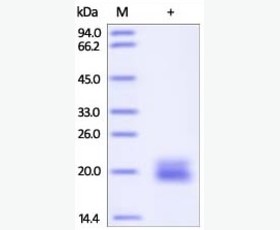Recombinant Human Proenkephalin-A
| Product name: | Recombinant Human Proenkephalin-A |
| Source: | Human Cells |
| Purity: | Greater than 95% as determined by reducing SDS-PAGE. |
| Buffer Formulation: | Lyophilized from a 0.2 μm filtered solution of 20mM PB,150mM NaCl,pH7.4. |
| Applications: | Applications:SDS-PAGE; WB; ELISA; IP. |
| Storage: | Avoid repeated freeze/thaw cycles. Store at 2-8 oC for one month. Aliquot and store at -80 oC for 12 months. |
| UOM: | 100ug/50ug/200ug/1mg/1g |
| Source | Human Cells |
| Description | Recombinant Human Proenkephalin-A is produced by our Mammalian expression system and the target gene encoding Glu25-Phe267 is expressed with a 6His tag at the C-terminus. |
| Names | Proenkephalin-A, Synenkephalin, Met-Enkephalin, Leu-Enkephalin, PENK |
| Accession # | P01210 |
| Formulation | Lyophilized from a 0.2 μm filtered solution of 20mM PB,150mM NaCl,pH7.4. |
| Shipping |
The product is shipped at ambient temperature. |
| Reconstitution |
Always centrifuge tubes before opening. Do not mix by vortex or pipetting. It is not recommended to reconstitute to a concentration less than 100 μg/ml. Dissolve the lyophilized protein in ddH2O. Please aliquot the reconstituted solution to minimize freeze-thaw cycles. |
| Storage |
Lyophilized protein should be stored at < -20°C, though stable at room temperature for 3 weeks. Reconstituted protein solution can be stored at 4-7°C for 2-7 days. Aliquots of reconstituted samples are stable at < -20°C for 3 months. |
| Purity |
Greater than 95% as determined by reducing SDS-PAGE. |
| Endotoxin | Less than 0.1 ng/µg (1 IEU/µg) as determined by LAL test. |
| Amino Acid Sequence |
ECSQDCATCSYRLVRPADINFLACVMECEGKLPSLKIWETCKELLQLSKPELPQDGTSTLRENSK PEESHLLAKRYGGFMKRYGGFMKKMDELYPMEPEEEANGSEILAKRYGGFMKKDAEEDDSLANSS DLLKELLETGDNRERSHHQDGSDNEEEVSKRYGGFMRGLKRSPQLEDEAKELQKRYGGFMRRVGR PEWWMDYQKRYGGFLKRFAEALPSDEEGESYSKEVPEMEKRYGGFMRFVDHHHHHH
|
| Background | Proenkephalin-A is a secreted protein that belongs to the opioid neuropeptide precursor family. Proenkephalin-A is an endogenous opioid polypeptide hormone which, via proteolyic cleavage, produces the enkephalin peptides [Met]enkephalin, and to a lesser extent, [Leu]enkephalin. Met- and Leu-enkephalins compete with and mimic the effects of opiate drugs. They play a role in a number of physiologic functions, including pain perception and responses to stress. Proenkephalin-A (114-133) and Proenkephalin-A (237-258) increase glutamate release in the striatum. Proenkephalin-A (114-133) decreases GABA concentration in the striatum. |














